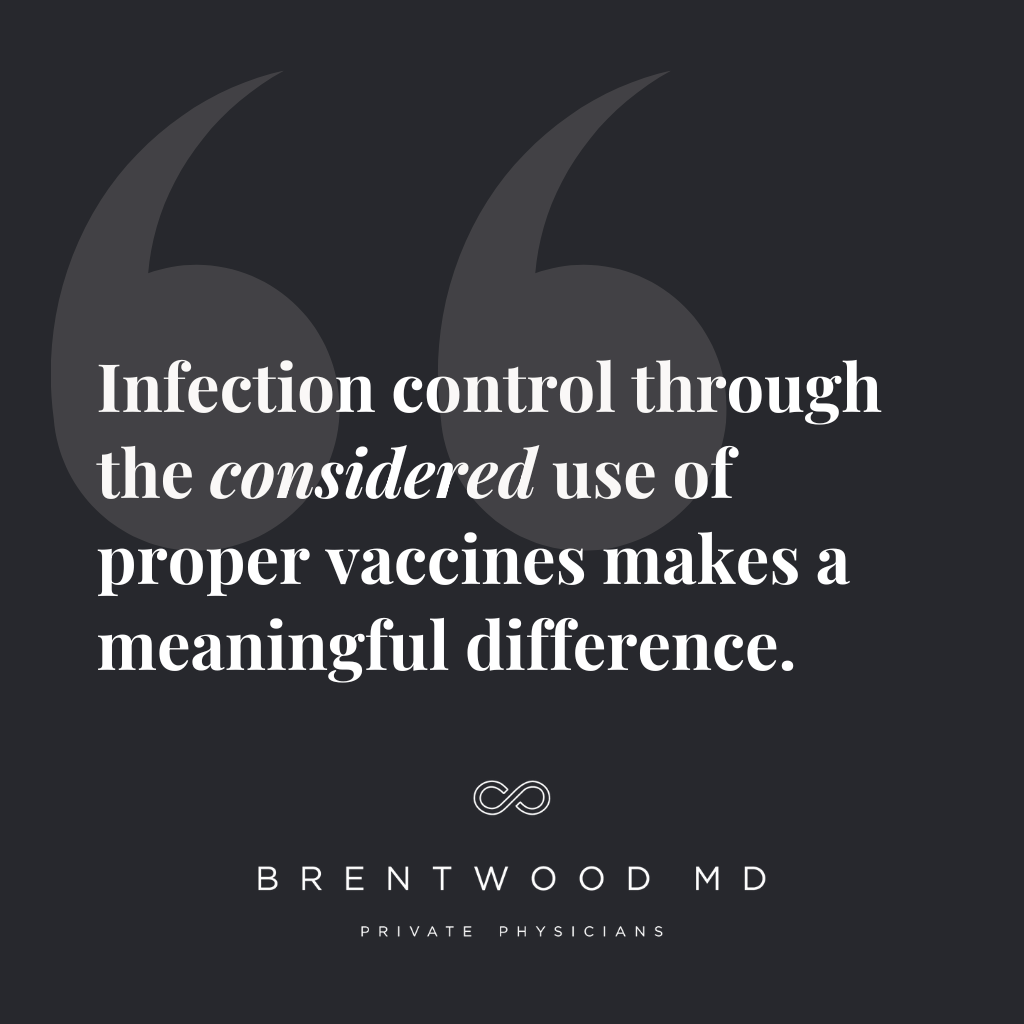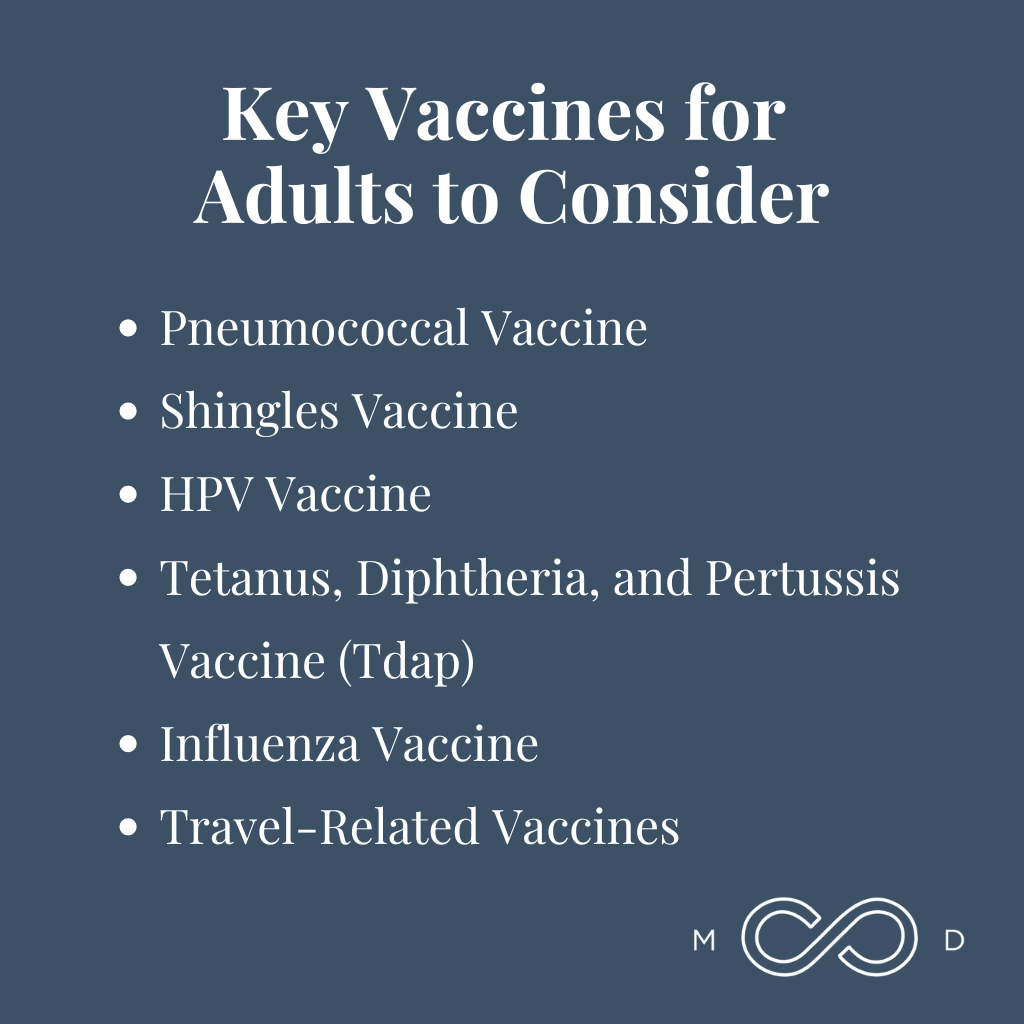Most of us remember getting a few vaccines as kids, maybe even up through college. Our parents and our pediatricians kept records and let us know when our next shot was due.
After submitting our final school vaccine records, however, most of us go AWOL on immunizations. We might wonder whether a vaccine schedule for adults even exists.
The truth is, adult vaccinations are crucial for guarding against certain serious illnesses and maintaining long-term health. But unlike in childhood, no one hands you a handy vaccine schedule as part of your how-to-adult toolkit.
So, let’s talk about it. Do adults need vaccinations? Is there such a thing as a vaccine schedule for adults? What concerns should we have about getting vaccines?
Adult Vaccine Schedules: Why Grown-Up Immunizations Matter
First, let’s look deeper into why vaccines make a difference in a proactive health plan as we age.
Preventative Care Foundation
Vaccines are a cornerstone of good preventative care. As we age, infections become a more serious threat to our health and longevity. Our bodies may not bounce back from illness quite as quickly as they once did, and the risk of complications increases.
In fact, infections rank among the top 10 killers of human beings. Vaccines help bolster our natural defenses, reducing the risk of contracting these illnesses.
While preventing death ranks high on the list of vaccine considerations, avoiding complications that might exacerbate existing health conditions or lead to new ones also plays a role.
So, when we’re aiming for a robust lifespan and healthspan, infection control through the considered use of proper vaccines makes a meaningful difference.
Adult Vaccines: The Crucial Doctor-Patient Relationship
Notice the word considered above. Unlike standardized childhood vaccine schedules, adult vaccination needs are highly individualized. In other words, as we progress through adulthood, our needs become much more unique to our personal situations.
As such, maintaining a strong doctor-patient relationship with a physician you trust is crucial in planning an appropriate adult vaccine schedule.
When a primary care physician is able to spend adequate time with you, they know you. They understand the intricacies of your life — your profession, your travel, your hobbies, your risk of exposure, etc. — and they can use that knowledge to tailor their vaccine recommendations for your specific situation.
Without such a relationship, a physician may only follow age-based guidelines for adult vaccines — or worse, they may not realize you need a particular vaccine at all.
How to Craft Your Unique Adult Vaccine Schedule
Below are three key factors for you and your physician to consider when evaluating your vaccine needs:
Personal Susceptibility to Disease
Vaccines are particularly useful for people with elevated risk factors in their health. The factors aren’t always obvious, so it’s important to share a true and thorough medical history with your doctor. That way, you both have all the information you need to determine an appropriate adult vaccine schedule.
Important factors include:
- Health conditions like diabetes, chronic kidney disease, asthma, and COPD, which often indicate a person would benefit from the protection of certain vaccines.
- Lifestyle factors, like smoking or alcohol use, which can increase a person’s infection risk and influence vaccine decisions.
- Pregnancy, as some vaccines are recommended before or during pregnancy to protect both mother and baby.
Risk of Exposure
Your likelihood of encountering certain illnesses is another critical factor in deciding which vaccines to receive and when. Important factors may include:
- Occupation: Healthcare workers, for instance, may need additional vaccinations due to their increased exposure to illnesses.
- Volunteer activities: Working in prisons or nursing homes, for example, might necessitate certain vaccines.
- Military service: Deployment to different regions may require specific immunizations.
- Travel plans: International travel often merits additional vaccinations based on prevalent illnesses or differing sanitation standards at your destination.
A Risk to Your Personal Community
Though not about your health directly, another factor to consider in adult vaccine schedules is the people in your immediate community. Do you have immunocompromised family members or friends? Are you caring for an aging parent or working with young children?
If you have close contact with high-risk individuals, consider your potential to transmit infections to others. A viral or bacterial infection that has little impact on you could devastate the health of a compromised individual if transmitted.
To avoid such a situation, talk with your doctor about which, if any, vaccines to include in light of risks in your personal community.
Key Vaccines for Adults to Consider
Some vaccines, like meningococcal vaccines, are only appropriate for adults with specific risk factors.
Other vaccines, such as those outlined below, address more widespread and common conditions that can affect even healthy individuals. As such, these form a good starting point for vaccine discussion with your primary care physician.
Pneumococcal Vaccine
Recommended for all adults 65 and older, pneumococcal vaccines protect against pneumonia and other serious infections. Some adults under 65 with certain health conditions may also benefit from this vaccine.
Pneumococcal vaccines offer an excellent example of the importance of maintaining a strong relationship with your physician.
Vaccine recommendations can change based on advancing research and new versions. Previously, two pneumococcal vaccines shared the top spot for preventing pneumonia caused by various strains of bacteria. In 2021, however, Prevnar 20 emerged as a preferred vaccine, more effectively protecting against a greater number of strains of pneumonia-causing bacteria with a single shot.
Developments like this can be confusing. If you received the previous version of the immunization, should you get the new version? If so, when? Your doctor can help you navigate these questions and others with your specific health needs in mind.
Shingles Vaccine
Did you ever have chickenpox? For those of us who grew up in the latter half of the 20th century, contracting this itchy illness was almost a foregone conclusion.
What we didn’t know, as we stayed home from school and watched The Price Is Right while trying not to scratch, is that the chickenpox virus would never leave us. Even after our symptoms resolved, the chickenpox virus — varicella zoster — lay dormant in our nervous system.
Later, as stress, age, and certain medical conditions affect our systems, the virus sometimes reactivates to cause a different disease: shingles.
Chickenpox wasn’t exactly fun, but shingles is a whole other ballgame. While it can be itchy, shingles typically causes serious pain as the virus erupts along nerve pathways. It can also cause serious complications, depending on where the virus activates.
For adults 50 and older who’ve had chickenpox, the shingles vaccine is an important consideration. The vaccine essentially reminds our immune system what the virus from childhood looks like, helping our body to prevent it from reemerging and causing painful outbreaks.
Shingrix, a relatively new shingles vaccine, has replaced older versions due to its improved safety profile, greater effectiveness, and longer-lasting protection. Even if you’ve already received an older version, your physician may recommend you get this more effective vaccine.
HPV Vaccine
The human papillomavirus (HPV) comes in many varieties and is known to cause warts, but it can have a much more sinister effect in certain circumstances. We now know that genital and oral infections with certain strains of HPV can cause specific types of cancer in later life.
Typically started in adolescence, HPV vaccines like Gardasil were developed to prevent this most dangerous type of infection. For adults, the vaccines can be given up to age 45, potentially preventing cancers like cervical, penile, anal, and oropharyngeal.
Since the vaccine’s introduction, we’ve seen a decrease in the incidence of cervical cancers in women, showing its effectiveness as a cancer prevention tool. This vaccine represents a significant advancement in our ability to prevent certain types of cancer through immunization.
Tetanus, Diphtheria, and Pertussis Vaccine (Tdap)
Tetanus, diphtheria, and pertussis are three serious bacterial infections all prevented by one vaccine: the Tdap vaccine.
Tetanus results from bacteria entering the body through a cut, such as from a nail lurking near a construction site or a barbed-wire fence. It affects the nerves, causing the muscles to stiffen and potentially leading to life-threatening complications. The tetanus vaccine is one of the oldest, most tried-and-true vaccines in our medical arsenal.
Diphtheria has become rare in the U.S. since the introduction of the Tdap vaccine, but you can still contract it during international travel or from unvaccinated individuals. Diphtheria involves a toxin-producing bacteria and can interfere with breathing and cause swollen tonsils and glands.
Pertussis, also known as whooping cough, is a nasty, highly contagious infection that’s particularly dangerous for babies. The Tdap vaccine not only protects adults from the disease but also keeps adults from spreading the disease to vulnerable infants. It’s an excellent example of how personal vaccination decisions can influence the health of those around you.
While you likely received the Tdap vaccine as a child, adult vaccination schedules recommend a Tdap booster every 10 years to maintain immunity.
Influenza Vaccine
The flu, or influenza, has become such a regular part of our yearly sickness cycle that we can sometimes forget this is a potentially deadly disease. Every year, thousands of adults and children in the United States die of the flu.
The flu is especially dangerous to the very young, the elderly, and the immunocompromised. That said, it can also harm perfectly healthy adults. Since the virus changes every year, its effects and their severity can change as well.
We’ve become so used to the flu that we may have lost our appreciation for the flu vaccine. Plus, lots of myths have arisen about the flu shot over the years, such as the claim that it can give you the flu (it can’t).
Most adults should get a flu shot every year, pending a conversation with their doctor. Each flu season, the vaccine gets updated to target what we think will become the prevalent flu strain that year. It’s a valuable first line of offense against the flu.
Travel-Related Vaccines
Some of the most common vaccine questions I get relate to international travel. When do you need a vaccine to roam safely through another country?
While a family vacation to London or Berlin probably won’t require an extra vaccine, trips to less-developed countries often do. For example, less-developed countries may not have the same sanitation or preparation practices for water and food as we’re accustomed to in the United States, heightening the risk of contracting certain illnesses.
Common diseases that merit additional vaccines for travel in developing nations include:
- Hepatitis A
- Typhoid
- Cholera
- Yellow fever
Though not a vaccine, travelers to certain countries may also require preventative malaria medication.
While it’s always best to discuss international travel plans with a physician, you can also refer to the CDC’s traveler guidelines for an idea of recommended vaccines for your destination.
Vaccine Concerns
Just like any medication you put in your body, vaccines have side effects. These side effects vary from very mild, such as minor pain from the injection, to serious, such as anaphylaxis.
As physicians, our job isn’t to blindly recommend all vaccines to everyone; rather, it’s to carefully weigh the risks of each vaccine against its likely benefit for the individual.
While most vaccine side effects are mild and short-lived (like fatigue, muscle aches, and even low fever), we’re always vigilant about the rare but serious potential reactions. Our goal is to have an open, honest conversation about both the benefits and risks, allowing you to make an informed decision about your health.
Vaccine Schedule for Adults: Final Thoughts
Though a few vaccines likely suit a wide variety of people, there’s no one-size-fits-all vaccine schedule for adults. Our lives and health are so unique that a trusted physician’s input really is necessary to determine which immunizations make sense.
To cultivate optimal health for as long as possible, speak with your physician to tailor a personalized schedule that fits your age, risk factors, and lifestyle. Be sure to bring up any concerns you have and talk through them together thoroughly so you can make the most well-informed decisions possible for your health and longevity.

Dr. Wright joined Brentwood MD in 2022 as the model allows him to spend more time connecting with patients and build a foundation of exceptional care. He is a Nashville native and completed his family medicine residency at the University of Tennessee Health Science Center, where he also served as Chief Resident. He believes that your health deserves a prominent position on your priority list, and would be honored to serve you and your family.









